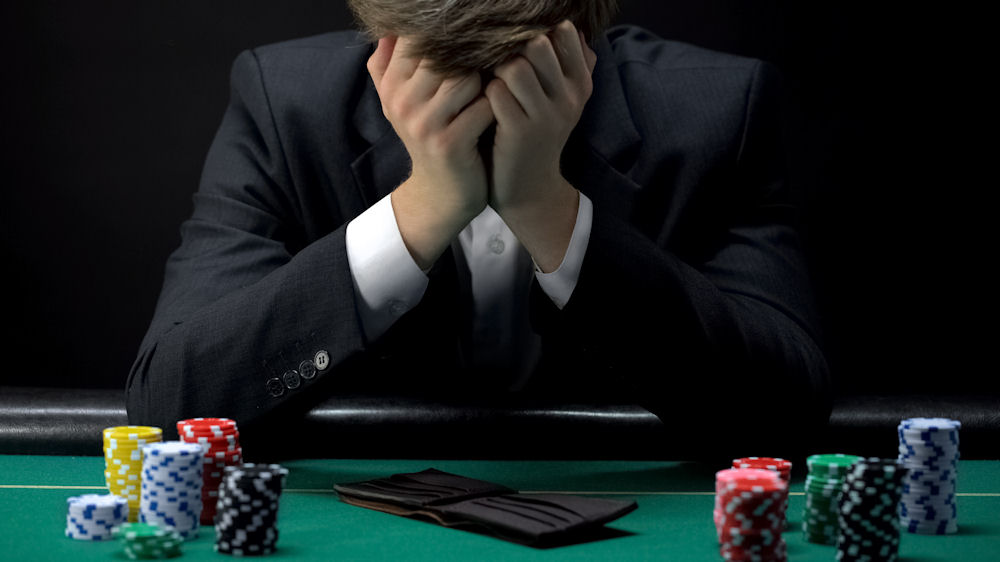Gambling Addiction Treatment Center in New Jersey
Gambling addiction is a serious issue that can cause emotional, financial, and relational damage, not only to the individual but also to their loved ones. If you or someone you care about is dealing with gambling-related behaviors, it’s important to seek support and understand your treatment options.
Our goal is to help you reclaim your life through evidence-based care, education, and resources. Learn how our addiction treatment programs in New Jersey can help you or a loved one today.
A process addiction, also known as a behavioral or impulse control disorder, involves compulsive engagement in rewarding activities that do not involve substances. Common examples include gambling addiction, compulsive shopping, internet use, and sex addiction. These behaviors provide short-term relief or pleasure, but over time, they can lead to serious emotional, financial, and social consequences.

While gambling addiction may appear more severe due to its potential financial impact, any repetitive behavior that begins to interfere with daily life, relationships, or emotional health can be just as harmful, whether it’s time spent online, at the casino, or compulsively shopping.
At Discovery Institute, we focus on treating substance use disorders. We may be able to support individuals with mild process addictions like gambling, provided they co-occur with drug or alcohol use. Take the first step to recover, starting with detox in New Jersey.
Gambling Addiction Statistics
Gambling can start as a harmless form of entertainment, but it can quickly spiral out of control for some individuals. The thrill of winning and the devastation of losing can become addictive, leading to serious consequences for both the gambler and their loved ones. Some gamblers find themselves unable to stop, risking thousands of dollars in a short time.
Gambling addiction affects an estimated 1–3% of adults in the United States, with over 2 million meeting the criteria for severe gambling disorder each year. Despite the growing accessibility of online betting, only 8% of those struggling ever seek help. Problem gambling is also linked to high rates of suicide attempts—1 in 5 gamblers reportedly attempt suicide.
Online gambling and sports betting are major contributors to this rise. In 2025, 52% of sports bettors admitted to chasing losses, and 37% bet more than they could afford. The social cost of gambling addiction in the United States exceeds $14 billion annually.
At Discovery Institute, our residential addiction treatment center in NJ supports clients with mild gambling issues only, secondary to substance use disorders. If you’re unsure whether your situation qualifies, contact us for a confidential assessment.
CONTACT US
Find out how we can help
Our compassionate counselors are standing by to answer any questions you may have. After helping thousands of people over the last 50 years, we have the resources to help you and your family and all your individual needs.
Signs and Symptoms of Problem Gambling
Regrettably, identifying these warning signs can be challenging, particularly if the individual with a gambling problem is in denial. In many households, the initial indication of a gambling issue within a family member is the sudden loss of a significant amount of money. However, there are additional indicators to be vigilant about that can help mitigate severe harm to a family’s well-being.
Unlike casual gamblers, problem gamblers may exhibit the following behaviors:
- Sacrificing favorite hobbies, recreational activities, or family gatherings to engage in gambling.
- Opening new checking accounts or applying for unnecessary credit cards to obtain more money. Possessing substantial amounts of cash that subsequently vanish.
- Acting secretive or defensive regarding their gambling activities.
- Experiencing difficulties at work or conflicts in relationships due to gambling wins or losses.
- Losing control over the amount of money wagered during gambling sessions.
- Attempting unsuccessfully to quit gambling.
- They are placing increasingly larger bets or taking progressively riskier actions, such as borrowing money from illegal sources or stealing from others.
- Expressing feelings of guilt, shame, or remorse about gambling, but being unable to stop.
- Requesting to borrow money from friends or family members without any apparent need for additional funds.
- Engaging in deceitful behavior regarding activities or spending habits.
- Spending excessive time online and refusing to discuss computer-related activities.
Besides the financial consequences of gambling, there are various psychological and physical repercussions, including:
- Anxiety
- Depression
- Substance abuse
- Insomnia
- Stomach issues
- Heart conditions
Learn how our holistic addiction treatment addresses the whole person – mind, body, and spirit – to help our clients overcome substance use along with any co-occurring behavioral health conditions. Get the help you deserve today.
Causes and Risk Factors of Excessive Gambling
Pathological gambling, also referred to as compulsive gambling, elicits physical and emotional responses that resemble those triggered by drug or alcohol use. A significant win can stimulate the release of naturally occurring chemicals like dopamine and norepinephrine, resulting in a surge of pleasure, energy, and a sense of power and invincibility. Research cited in the Indian Journal of Psychological Medicine suggests that individuals with a gambling problem may have lower levels of norepinephrine, a chemical responsible for generating feelings of energy. The euphoria experienced from a gambling victory may compensate for the lack of such sensations in their natural chemistry.
The likelihood of developing an addiction to gambling or any other substance or process is heightened if one or more close relatives have a history of compulsive behavior or addiction. According to Alcohol Research & Health, the risk of alcoholism is up to 60 percent higher in individuals, regardless of gender, who have a family history of alcohol abuse. This genetic predisposition seems to extend to other forms of substance abuse, as well as process addictions such as gambling.
Residing in an environment where gambling is prevalent and widely accepted can increase the probability of developing compulsive tendencies. Other social factors, such as social isolation, peer pressure to gamble, or the frequent misuse of drugs or alcohol, may contribute to problem gambling. Some individuals engage in gambling as a means of combating loneliness and seeking distraction, while others may do so to alleviate stress or gain validation from their peers.
Pathological gambling is frequently observed in individuals with a concurrent mental health condition like depression, bipolar disorder, anxiety, or a substance use disorder. Impulse control disorders and attention-deficit hyperactivity disorder (ADHD) can also elevate the likelihood of developing issues with gambling.
Dangers Of A Process Addiction
While gambling addictions do not have the same detrimental effects on a person’s physical health, they still pose a large issue for a person’s well-being through mental illness, financial troubles, family issues, and even possibly getting into debt trouble.
This type of addiction differs from substance-related addictions because they do not have a definite link to deteriorating physical health. However, a person’s well-being is not completely contingent on their physical health. A person’s mental state is a large contributor to their physical health. A gambling addiction can have extremely negative impacts on a person’s mental health.
The Side Effects Of Gambling Addiction
Similar to a substance use disorder (SUD), gambling addiction involves a loss of control over behavior, resulting in adverse effects in various aspects of an individual’s life. Individuals with gambling addictions may prioritize gambling over responsibilities such as financial obligations, caregiving, and work. They may also exhibit withdrawal symptoms when attempting to stop gambling, along with escalating bets to recover losses.
The consequences of gambling addiction extend beyond financial issues and may include:
- Compromised mental health
- Strained relationships
- Financial instability
- Legal problems
- Job loss
- Overall decline in quality of life
Moreover, the compulsive need to gamble can consume a significant amount of time and energy, resulting in the neglect of personal responsibilities and interests. This behavior can also have a detrimental impact on mental health.
Research shows that problem gamblers are six times more likely to attempt suicide compared to individuals with other addictions. As gambling addiction progresses, individuals may resort to desperate measures, such as facing legal consequences, losing jobs and friendships, and filing for bankruptcy, all of which can contribute to suicidal thoughts.
At Discovery Institute, we understand the serious toll gambling can take, especially when paired with substance use. If you’re facing gambling-related challenges alongside drug or alcohol addiction, we may be able to help through our integrated, evidence-based drug rehab center in NJ.
How Does Gambling Affect Your Brain?

Gambling can stimulate various cognitive functions and neural networks within the brain, leading to significant effects. The release of dopamine, a neurotransmitter associated with pleasure and reinforcement, occurs when individuals experience the excitement and risk associated with gambling, resulting in a surge of adrenaline and a sense of thrill. However, for those who develop a gambling addiction, the compulsive nature of the behavior can alter the brain’s reward processing.
Continuous exposure to dopamine receptor stimulation can lead to desensitization, requiring higher levels of stimulation to achieve the same pleasurable response. Additionally, the stress response system in the brain may be activated due to the anxiety and tension caused by gambling losses, leading to increased levels of cortisol. These physiological changes have the potential to cause cognitive distortions, impaired decision-making abilities, and a greater susceptibility to addictive behaviors over time.
When a person struggles with a gambling addiction, their mind is constantly focused on gambling. This constant focus is on something very stressful, which leads a person to be continuously stressed. On top of this, if the person loses money due to their gambling addiction, they could have financial issues at home. This could lead to even more stress. Thus, it is not uncommon for a person struggling with a gambling addiction to develop anxiety.
This is what is known as euphoric recall. It occurs when the problem gambler recalls the good times, associating those moments with their behavior, rather than thinking about the negative consequences of these habits, which will not only be short-term but also long-term.
Gambling and Drug Addiction: What’s the Connection?
Gambling, once viewed as harmless entertainment, has become a serious behavioral health concern with consequences that mirror those of drug and alcohol addiction. Like substance abuse, gambling can lead to financial ruin, damaged relationships, and profound emotional distress.
Research shows a strong link between gambling and substance use disorders. Individuals with a history of drug or alcohol addiction are significantly more likely to develop gambling problems. Both activate the brain’s reward system, flooding it with dopamine and reinforcing compulsive cravings. Over time, this leads to tolerance (needing bigger risks or higher “highs”) and even withdrawal-like symptoms, hallmarks of addiction.
Unlike drug addiction, gambling also involves cognitive distortions, false beliefs such as the “near-miss effect” or the hope that persistence will eventually lead to a win. This distorted thinking, combined with stress, anxiety, or financial desperation, fuels a destructive cycle similar to how drugs or alcohol are used to self-medicate.
For individuals in recovery from substance abuse, gambling poses an even greater risk. Because it activates the same neural pathways as drugs, it can trigger cravings and increase the likelihood of relapse.
Ultimately, gambling is far from a harmless pastime. Its neurological, psychological, and behavioral overlap with substance addiction underscores the importance of treating both within an integrated recovery program.
Addiction Of Any Kind is A Family Disease
Gambling addiction doesn’t just affect the individual—it impacts the entire family. Financial strain, emotional disconnect, and trust issues are common consequences that ripple through the household. This is especially true when the person struggling with addiction is responsible for managing money. Unlike other addictions, gambling directly involves financial decisions, making the toll on loved ones even more immediate and visible.
Families may feel neglected, stressed, or even betrayed as the person with a gambling addiction becomes consumed by their compulsion. Debt can accumulate rapidly, sometimes resulting in legal issues or severe consequences with creditors. In the worst cases, unresolved debt can result in bankruptcy, imprisonment, or criminal charges. Also, studies show that those with gambling problems tend to be at a higher risk of committing suicide. This risk of suicide is equal to or has surpassed the rates of people addicted to drugs and alcohol.
If your loved one is experiencing gambling addiction, especially in combination with substance use, an addiction intervention may help. An intervention provides a structured, compassionate opportunity to express concern and encourage them to seek professional help.
At Discovery Institute, we recognize that healing involves more than the individual—we support families throughout the recovery journey when substance use is the primary concern. If gambling is part of a broader addiction issue, we may be able to help.
Mental Illness and Gambling Addiction
Mental health plays a significant role in the development and progression of gambling addiction. Research shows a strong link between gambling behaviors and mental health disorders such as anxiety and depression. When an individual experiences both a mental illness and a gambling problem, this is known as a co-occurring disorder or dual diagnosis—a combination of two or more mental or behavioral health conditions.
Treating co-occurring disorders effectively requires an integrated, whole-person approach. That’s because mental health conditions and addictive behaviors often influence and worsen each other. For example, someone may use gambling to cope with depression or anxiety, which in turn can deepen their emotional distress over time.
At Discovery Institute, we specialize in dual diagnosis treatment in NJ for individuals facing substance use disorders alongside mental health challenges. While we do not treat gambling addiction as a primary condition, we may be able to support individuals who have mild gambling behaviors tied to a substance use issue. Our clinical team uses evidence-based therapies and individualized care plans to address the root causes of addiction and mental illness together, not in isolation.
Breaking the stigma surrounding mental illness, addiction, and gambling-related behaviors is essential. By shedding light on these co-occurring conditions, we can help more people access the comprehensive care they need for long-term recovery.
Help for Gambling Addiction
 Gambling addiction can take a devastating toll, impacting finances, relationships, mental health, and overall well-being. The compulsive urge to gamble often leads individuals to lose not only money but also their homes, jobs, and connections with loved ones. Breaking free from this destructive cycle requires professional support and a structured path to healing.
Gambling addiction can take a devastating toll, impacting finances, relationships, mental health, and overall well-being. The compulsive urge to gamble often leads individuals to lose not only money but also their homes, jobs, and connections with loved ones. Breaking free from this destructive cycle requires professional support and a structured path to healing.
While the Discovery Institute does not offer primary treatment for gambling addiction, our clinical team may be able to support individuals experiencing mild gambling behaviors when they co-occur with substance misuse. If gambling is contributing to a broader addiction issue, our program can help address it within a comprehensive treatment plan.
We focus on uncovering the root causes of addictive behaviors, building healthy coping skills, and fostering personal growth in a supportive environment. Depending on the client’s needs, treatment may take place in an inpatient or outpatient setting. Every client begins with a personalized admission assessment to determine the most appropriate level of care.
When gambling addiction is addressed alongside substance use, clients may benefit from a range of evidence-based services, including:
- Individual therapy
- Group therapy
- Cognitive Behavioral Therapy (CBT)
- Family therapy
If you’re unsure whether our program is right for your situation, we invite you to contact our admissions team. We’ll help you determine the best path forward—whether that’s with us or through a trusted referral partner.
The Importance Of A Continuing Care Plan
For individuals struggling with drugs, alcohol, and/or a co-occurring gambling addiction, detox is often the first step toward recovery. After establishing a strong foundation through inpatient treatment, clients may transition into outpatient care or gradually return to independent living.
At Discovery Institute, we understand that recovery doesn’t end when formal treatment does. That’s why we emphasize the value of a personalized continuing care plan. Ongoing support—including therapy, community resources, and relapse prevention in NJ—is essential for maintaining long-term success, especially when managing complex challenges like gambling addiction alongside substance use.
Our goal is to ensure every client has the structure, tools, and accountability needed to stay on track well beyond their time in treatment.
Contact Us Today: You’re Not Alone
If you or a loved one is struggling with gambling addiction alongside a substance use disorder, know that help is available. At Discovery Institute in New Jersey, our team is here to guide you through the first step toward recovery, starting with understanding your unique needs and building a path forward.
Not sure if your insurance covers treatment? Our easy-to-use insurance guide can help. Recovery doesn’t happen overnight, but it begins with one step: reaching out. You don’t have to face this alone. Contact us today to find out if our program is the right fit for you.
Discover
Your Potential
Finding a life of happiness and sobriety is possible. You are not alone! All you need to do is take the first step.




